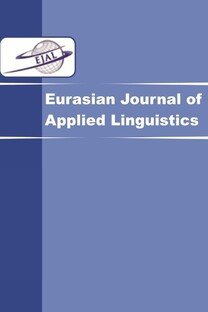Exploring global citizenship as a cross-curricular theme in Moroccan ELT textbooks
ELT, global citizenship, Moroccan high school, SBA textbook evaluation,
___
- Ait Bouzid, H (2016). Promoting values of religious tolerance through Moroccan ELT textbooks. Asian TEFL, 1(2), 89-100.
- Ait Bouzid, H., Erguig, R., & Yeou, M. (2016). Towards a reflective textbook evaluation model. EFL Journal, 1(3), 219-233.
- American Council on the Teaching of Foreign Languages. (1996). Standards for Foreign Language Learning: Preparing for the 21st Century. Alexandria: Author.
- Basarir, F. (2017). Examining the Perceptions of English Instructors Regarding the Incorporation of Global Citizenship Education into ELT. International Journal of Languages’ Education and Teaching, 5(4), 409-425.
- Byram, M. (2011). Intercultural citizenship from an internationalist perspective. Journal of the NUS Teaching Academy, 1(1), 10-20.
- Byram, M. (2003). Teaching languages for democratic citizenship in Europe and beyond. In K, Brown, & M, Brown (Eds.). Reflections on citizenship in a multilingual world, 15-24. London: Centre for Information on Language Teaching and Research.
- Cates, K. A. (2009). Teaching for a better world: Global issues and language education. Human Rights Education in Asian Schools, 5, 41-52.
- Creswell, J. W. (2012). Educational research: Planning, conducting and evaluating quantitative and qualitative research. Boston: Pearson Education Inc.
- Cunningsworth, A. (1995). Choosing your Coursebook. Oxford: Heinemann.
- De La Caba, M. & Atxurra, R. L. (2006). Democratic citizenship in textbooks in Spanish primary curriculum. Journal of Curriculum Studies,38(2), 205-228.
- Diaz, L. (2016). Citizenship education and the EFL standards: A critical reflection. Profile: Issues in teachers’ professional development, 19(1), 155-168.
- El Karfa, A. (2007). Open classroom communication and the learning of citizenship. English Teaching Forum, 4, 38-42.
- Erfani, S. M. (2012). The rationale for introducing “global issues” in English textbook development. Theory and Practice in Language Studies, 2(11), 2412-2416.
- Guilherme, M. (2002). Critical citizens for an intercultural world: Foreign language education as cultural politics. Clevedon: Multilingual Matters.
- Hammani, M., Ahssen, S., & Tansaoui, L. (2007). Ticket 2 English. Casablanca: D.I.O. El Hadita.
- Hassim, M., Blibil, M., & Rasmy, A. (2007). Gateway to English 2. Rabat: Nadia Edition.
- Kerr, D. (1999). Citizenship education in the curriculum: an international review. The School Field, 10(3), 7-32.
- Krippendorff, K. (2013). Content analysis: An introduction to its methodology. CA: SAGE Publications, Inc.
- Life Skills and Citizenship Education. (2017). Reimagining life skills and citizenship education in MENA. Amman: UNICEF.
- Litz, D. (2005). Textbook evaluation and EFL management: a South Korean case study. Asian EFL Journal, 48, 1-53.
- Ministry of National Education. (2007). English Language Guidelines for Secondary Schools: Common Core, first year, and second year baccalaureate. Rabat: Author.
- Najib, M., & El Haddad, E. (2007). Insights into English 2. Rabat: Al Massar Edition.
- O’Brien, M., & Parry, L. (2002). From national identity to global citizenship: challenges for citizenship education in Australia. The International Journal of Social Education, 17(1), 31-40.
- OXFAM. (2015). English and global citizenship. Retrieved from https://www.oxfam.org.uk/education/resources/english-and-global-citizenship
- Pederson, P. & Cogan, J. (2002). Civics education, pedagogy, and assessment in the Pacific Rim:Six cases. The International Journal of Social Education, 17(1), 16-30.
- UNESCO. (2015). Global citizenship education: Topics and learning objectives. Paris: Author.
- Weninger, C. & Kiss, T. (2013). Culture in English as a Foreign Language (EFL) Textbooks: A Semiotic Approach. TESOL Quarterly, 47(4), 694-716.
- Yakovchuk, N. (2004). Global issues and global values in foreign language education: Selection and awareness-raising. ELTED, 8, 28-47.
- Zhu, J. (2013). Citizenship education and foreign language teaching: Deconstructing the concept of good citizenship embedded in foreign language curricula in China and America. Utah: Utah State University.
- ISSN: 2149-1135
- Yayın Aralığı: 3
- Başlangıç: 2015
- Yayıncı: Ece Zehir Topkaya
The structural sensitivity of elicited imitation as a measure of implicit grammatical knowledge
Promoting extended student talk in an EFL classroom
Laya Heidari DARANİ, Mostafa Morady MOGHADDAM
Exploring global citizenship as a cross-curricular theme in Moroccan ELT textbooks
‘Please’ as an impoliteness marker in English discourse
